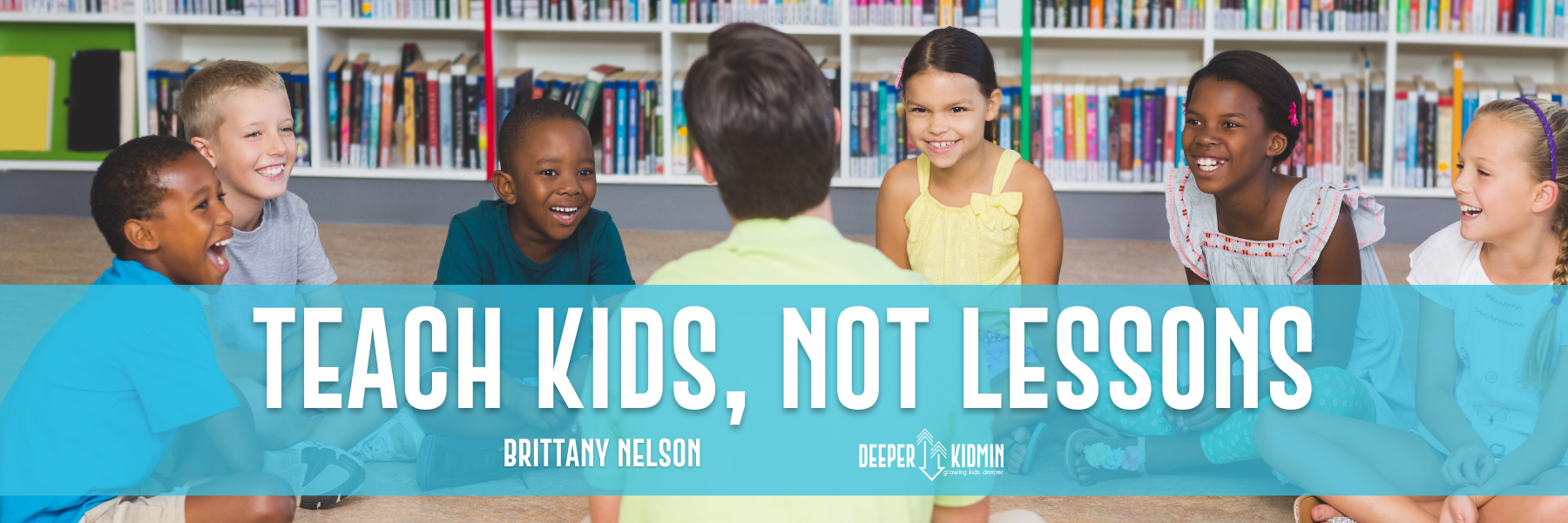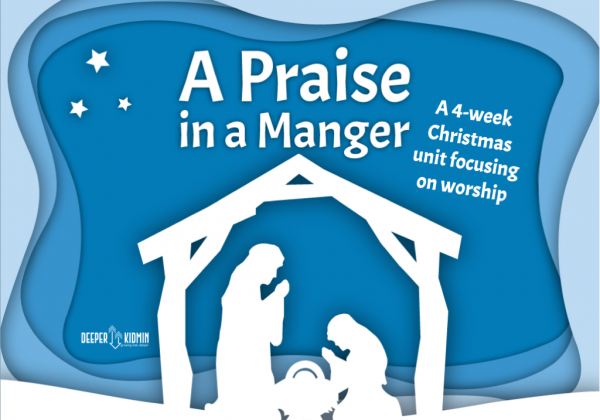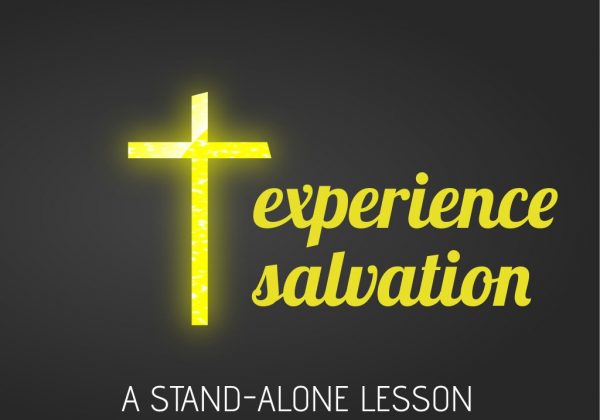
Thanks for joining me at my Teach Kids, Not Lessons Breakout session! Below you’ll find a copy of the notes for the breakout, links to the free downloads I mentioned, and even a few additional resources. Have more questions? Email me at brittany@deeperkidmin.com.
What would you say is the most important aspect of your lesson each week? The “hook”? The gamification elements? The life application?
Plot twist! One of the most important aspects of your lesson doesn’t even have to do with the lesson itself. It’s actually the KIDS you are teaching and how well you know them! Effective and creative Bible teachers place as much value on knowing the children they teach as on the content of the lesson.
Yes, solid content and preparation are important, but if you’re not taking a few characteristics about the kids you teach into account, your effectiveness drastically decreases.
So here are 3 keys to teaching kids, not just lessons…
(Click each title below to expand the section and find notes + downloads regarding that topic.)
Know Your Kids Relationally
Children’s faith develops based on who they love and mimic, not what they do or know. So often, children’s ministry can become about helping kids memorize scripture and know the right answers. And while those things are important to a Biblical faith foundation, the most vital thing is relationships with mentors and leaders in the Christian faith.
Recent research from Barna and Awana show that the most significant factor in a child’s faith resilience is a strong relationship with a caring adult. Rita Pierson, an educator for 40 years, says in her Ted Talk: “Kids don’t learn from people they don’t like.”
Kids are more receptive to our teachings when they feel known and loved by us, so we have to take the time to build relationships with them both on Sunday mornings and outside of Sunday mornings.
How?
Build trust with new kids – The easiest way to build trust? Learn their names. Research has shown that hearing your own name, especially when said in a positive and excited tone of voice, causes a chemical reaction in the brain that releases feel-good hormones like dopamine and serotonin. This physical burst of excitement in a child’s brain when they hear their name helps build empathy, trust, and connection with that child. Learning your kids’ names and using them often will foster connections between you and between them! Also help new kids connect with another child in your ministry and with a volunteer, and check in on a new child at least once throughout the morning.
Encourage questions – As concrete thinkers who are trying to discover the world and their place in it, elementary kids have a lot of questions. But they don’t often feel confident enough to say them out loud. When kids know they can ask questions without consequence or judgment, it builds trust, and it’s healthy for kids to see that sometimes we as adults don’t have all the answers either. Encourage kids’ questions with this simple routine that lets them know it’s OK to have questions about the Bible. Inviting kids to guide the conversation with the questions they have also helps you engage their interests in the Bible story and helps you see how they’re thinking about and applying the lesson. Before beginning your regular review questions or other small group activities, ask this simple question: “Do you have any questions about today’s Bible story?”
Step into their world – Get out of your office and out of the church. Learn about the rhythms and seasons of life for your families, then find ways to be part of them. Create individualized engagement whenever you can and come up with a system for tracking it. If your schools are allowing guests, use this free lunch at school printable to help you connect with kids at school lunch!
Know Their Interests – Do you know what games your kids are playing or the tv shows they’re watching? What about their favorite candy or subject in school? Super simple idea: ask them to fill out an About Me Page like this one each year. Then take their favorites and incorporate them into your teaching. When we know what makes kids excited in their everyday lives, we can tap into those passions when we teach to better engage them with the gospel.
Fun! – For a kid, fun and games are how their brains are wired to learn and to connect. Fun is a child’s love language. So be OK with downtime in your ministry where kids just get to hang out, build relationships, and have fun together. And maybe even consider an entire event that’s solely focused on providing space for kids to have fun together.
Shared memories – When kids create memories together through special events like VBS, it forms bonds that help them grow together too. (And if you’re looking for inspiration about special events to host in your ministry, check out our favorites here!)
Know Your Kids Developmentally
While children may progress through stages of learning at different rates, they tend to follow the same patterns of development from birth to the preteen years, and when we engage kids based on their developmental stage, we can more effectively teach them.
Use the information below to gain a general overview of a child’s characteristics in each stage and what that means for a practical application to ministry.
Download a free Developmental Cheat Sheet here!
Pro tip: Include this information in your volunteer training event to really set up your team for success.
Nursery:
- Developing a sense of trust as needs are met consistently
- Sensing attitudes and expression of love
- Physical observations are important for learning
- Can sing simple songs to God and listen to Bible stories
- Sense of self-autonomy and independence begins to develop in toddlerhood (“I can do it!”)
Preschool:
- Creative and emotional learning; imaginative play is the most common form of learning
- Influenced by images, stories, and symbols
- Logical thinking is not yet present (which is why you can never win an argument against a preschooler)
- Begin to develop self-worth based on how useful, purposeful, and competent they feel
- Everything can be a game
- There is no distinction between imagination and reality
- Highly curious about the world around them (“Why?”)
- Thrive with routine and repetition
- Unable to adopt another person’s perspective
- Grow rapidly and are very active/high energy while still needing periods of rest
- Still developing fine motor skills
- Exploring the sense of right and wrong
Elementary:
- Concrete, literal thinkers
- Attention spans are lengthening
- A clear sense of justice/fairness/right and wrong
- They tend to see things in very black and white terms
- They need repetition and clear application; learn best when they see something in their present environment
- Enjoy cooperative, group activities
- K/1st grade – Asking the question Do I have your attention? They want to know if we see them and notice them.
- 2nd/3rd grade – Asking the question Do I have what it takes? They want to know how they compare to their peers.
- Motivated by fun – anytime you can turn something into a game, you’re going to engage them
- Also starting to notice differences between themselves and others and upper elementary kids can finally start seeing the point of view of someone else
- Children begin to think logically and look for order in the world, but still find meaning in stories
Preteen:
- Abstract thinking emerges
- Starting to question their faith as it becomes their own
- Can begin to see the perspective of others
- Fitting into a community and with their peers increases in importance
- Begin to form their own philosophy of life and faith and how they themselves fit into their budding worldview
- Asking the question: Do I have friends? Friends start to take a larger priority in a child’s life by this age, and we have to help them develop those friendships.
Know Your Kids Intellectually
While kids develop through life stages in roughly the same process, how they develop depends on each one’s unique personality and learning style. A social learner will need to talk about what she is learning to best understand it, but a solitary learner will prefer to work and think alone. A physical learner will need hands-on experience with the idea, while a verbal learner might just need to write out the idea in his own words. We tend to teach the way we prefer to learn, so be aware of your own learning style so you can ensure a balance of teaching methods in your ministry. If we treat all learners the same, we invite boredom-induced chaos.
Pro tip: Teach your volunteer team about learning styles too! This resource makes it super easy.
Learning styles include:
- Visual
- Auditory
- Kinesthetic/tactile
- Verbal (reading/writing)
- Solitary vs social
The learning styles of digital natives (today’s kids who have grown up in a digital world) are even more nuanced than in previous generations. Intellectually, the very physical makeup of a digital native’s brain is wired differently than in generations past, and they need very different opportunities from a learning environment than in the past.
How digital natives learn:
- Used to speed and multitasking
- Learning is triggered by curiosity rather than a need to meet a milestone or checkmark
- Want to discover the answers on their own rather than have the answer told to them
- Learn best by doing and experiencing, not listening
- Highly motivated by games and competition
- Learn more about effectively teaching digital natives in a church setting in my book Time to Update!
Being aware of the different learning styles and preferences of the digital native children you serve will help you better engage them each week. Allowing children to interact with the day’s lesson in a variety of ways will help ensure you give each type of learner the opportunity to shine. One of my favorite ways to do this is through stations. Most curriculums offer a large-group, small-group format for Sunday mornings, but as a mobile church with limited time, space, and resources for creating an exciting environment, I had to come up with a way to make our mornings more engaging for kids.
So I adapted the big-name curriculum we were using to fit a new format: large-group time, then stations. Kids loved it! Read more about stations here.
Using stations, or at least evaluating the types of activities your children complete on a Sunday morning and whether or not they meet the intellectual needs of digital natives, can help increase your effectiveness as a teacher. Because you engage them in the unique way that God designed them, kids are more excited about learning and therefore more receptive to the teaching.
Download Links + Additional Resources
While the downloads I mentioned are also included in the notes above, use this complete list to access what you’re looking for quickly!
Free Downloads from Deeper KidMin:
- Kids Ministry Profile Assessment
- All About Me Printable
- Developmental Cheat Sheet
- Lunch at School Printable
And if you want more inspiration and resources for creative Bible teaching, check these out:
- (Blog Post) More information from Deeper KidMin about station rotations vs small groups
- (Website) LifeWay’s Levels of Biblical Learning Resources
- (Website) Orange’s It’s Just a Phase Resources
- (Book) Creative Bible Teaching by Lawrence Richards and Gary Bredfeldt
- (Resource) Digital Volunteer Training: Types of Learners
- (Book) Time to Update: 7 Areas to Integrate Digital Discipleship into Your Children’s Ministry Strategy by Brittany Nelson
Action Steps:
1) Evaluate your next lesson by asking these questions:
- Relationally: What part of this lesson allows me/leaders to connect with the kids? What part of this lesson allows kids to connect with each other?
- Developmentally: Are kids able to process the information presented based on their developmental level? What can I adapt to help meet the developmental needs of different age groups?
- Intellectually: Am I using at least 2 different learning styles in this lesson? Am I being mindful of digital natives and how they learn?
2) Use this Kids Ministry Profile Assessment to develop a profile of the children you lead in your ministry. Upon completion, utilize the information gathered to influence your decisions and teaching.






